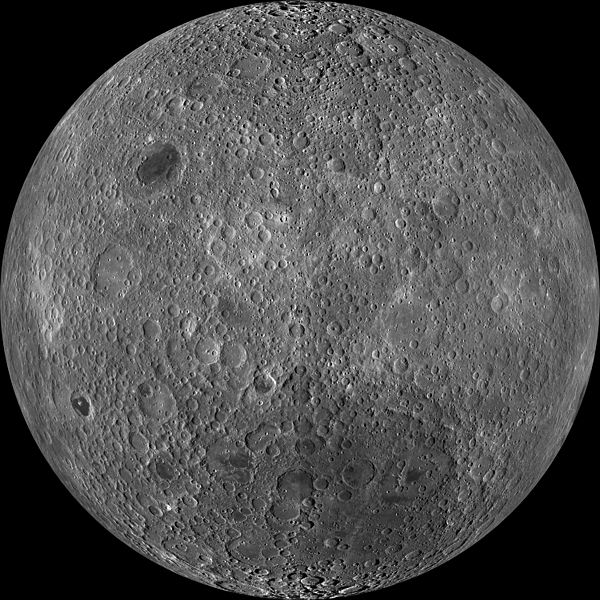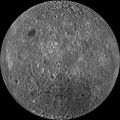Αρχείο:Moon Farside LRO.jpg
Εμφάνιση

Μέγεθος αυτής της προεπισκόπησης: 600 × 600 εικονοστοιχεία . Άλλες αναλύσεις: 240 × 240 εικονοστοιχεία | 480 × 480 εικονοστοιχεία | 768 × 768 εικονοστοιχεία | 1.024 × 1.024 εικονοστοιχεία | 2.048 × 2.048 εικονοστοιχεία | 18.000 × 18.000 εικονοστοιχεία.
Πρωτότυπο αρχείο (18.000 × 18.000 εικονοστοιχεία, μέγεθος αρχείου: 85,34 MB, τύπος MIME: image/jpeg)
Ιστορικό αρχείου
Πατήστε σε μια ημερομηνία/ώρα για να δείτε το αρχείο όπως εμφανιζόταν εκείνη την χρονική στιγμή.
| Ημερομηνία/Ώρα | Μικρογραφία | Διαστάσεις | Χρήστης | Σχόλιο | |
|---|---|---|---|---|---|
| τρέχον | 23:47, 19 Μαρτίου 2014 |  | 18.000 × 18.000 (85,34 MB) | Huntster | High resolution mosaic. |
| 04:12, 9 Απριλίου 2011 |  | 1.600 × 1.600 (1,44 MB) | Bubba73 | {{Information |Description ={{en|1=Far side of the Moon, by NASA's Lunar Recon. Orbiter}} |Source =http://apod.nasa.gov/apod/image/1104/farside_lro1600.jpg |Author =NASA - LRO |Date =2011? |Permission = |other_versions = } |
Χρήση αρχείου
Δεν υπάρχουν σελίδες που χρησιμοποιούν αυτό το αρχείο.
Καθολική χρήση αρχείου
Τα ακόλουθα άλλα wiki χρησιμοποιούν αυτό το αρχείο:
- Χρήση σε af.wikipedia.org
- Χρήση σε az.wikipedia.org
- Χρήση σε be.wikipedia.org
- Χρήση σε bjn.wikipedia.org
- Χρήση σε bn.wikipedia.org
- Χρήση σε bs.wikipedia.org
- Χρήση σε ca.wikipedia.org
- Χρήση σε cs.wikipedia.org
- Χρήση σε de.wikipedia.org
- Χρήση σε en.wikipedia.org
- Χρήση σε en.wikibooks.org
- Χρήση σε en.wikiversity.org
- Solar System, technical/Moon
- User:Marshallsumter/Radiation astronomy2/Visuals
- Draft:Original research/Planets
- User:Marshallsumter/Radiation astronomy2/Visuals/Quiz
- User:Marshallsumter/Rocks/Rocky objects/Astronomy
- User:Marshallsumter/Radiation astronomy/Courses/Principles/Hourly 2
- User:Marshallsumter/Radiation astronomy/Courses/Principles/Midterm quiz
- User:Marshallsumter/Radiation astronomy/Courses/Principles/Final quiz
- Titan/Quiz
- User:Marshallsumter/Rocks/Rocky objects
- Draft:Enceladus/Quiz
- Moon/Quiz
- Stars/Sun/Heliology/Quiz
- Earth/Quiz
- Stars/Reds/Quiz
- Draft:Dione/Quiz
- User:Marshallsumter/Radiation astronomy2/Scattered disks/Quiz
- User:Marshallsumter/Radiation astronomy1/Kuiper belts/Quiz
- Liquids/Liquid objects/Moon
- User:Marshallsumter/Radiation astronomy/Craters
- Χρήση σε es.wikipedia.org
Δείτε περισσότερη καθολική χρήση αυτού του αρχείου.


